- Home
- Jay Bonansinga
The Sleep Police Page 16
The Sleep Police Read online
Page 16
“We lost him in the alley,” the black orderly told the shrink as he approached, wiping the moisture from his head.
“Guy was pretty much psychotic,” the acne-scarred orderly added.
“I’ll do the diagnoses around here, thank you very much,” the twit shrink retorted. “Did he say anything?”
The black orderly just wiped his mouth with the back of his hand, then sighed wearily before answering. “Didn’t say a thing, just looked at the two of us like we were a couple of one-eyed monsters.”
CHAPTER TWENTY-FIVE
The storm lashed the elevated platform on Howard Street, the hard rain slanting down through cones of sodium light and striking the weathered boardwalk like tacks from a nail gun. The wind was a bullwhip, shaking the stalls, rattling the fiberglass canopies, the wind and thunder making primordial moaning sounds. In the distance, the skyline shimmered like a mirage.
Frank stood alone at the end of the platform, huddled next to the deserted rail shack in a solitary pool of hazy yellow light. He was gripping the pay phone receiver so tightly it was making his knuckles white and threatening to pop the stitches in his wrist.
“This is Deets,” said a voice on the other end after the fifth ring.
“D, thank God,” Frank said into the phone. He was shivering in his rain-slick windbreaker. His instinct told him that he should be indoors, wandering through innocuous public places, hiding in plain sight and all that. But a deeper knowledge of the streets told him that was wrong. He had chased enough skels to know that a person is harder to catch on the street. There are too many avenues of escape.
“Who is this?”
Frank wiped moisture from his face. “Jesus, I can’t believe I remembered your cell number, I can’t believe I remembered it.”
After a millisecond of tense silence: “You got to be kidding me.”
“Where are you, D?”
“Where am I?—Jesus, Frank, it’s three in the morning—where do you think I am?”
Frank took a breath. “I’m sorry for all the shit I’ve been putting you through, and I might as well tell you before we go much further, I’m at a pay phone right now, and I’m going to be long gone before you run a trace.”
“Frank, don’t do this to me.”
“D, you’re the last guy I would want to jack around—”
“Turn yourself in, Frank. You’re not right in the head. It’s not a sin.”
“I can’t turn myself in yet, D, not yet. If you could just hear me out, just do me this one solid.”
“They got a freakin’ bulletin out for your ass.”
“D—”
“You’re number one on the hit parade, Frank. They’ll find you.”
“D, listen, please. I’m just asking you to do me this one favor, and listen to what I have to say.”
Another shot of taut silence, as the rain lashed the platform around Frank. The noise was tremendous. Frank nervously threaded sore fingers through his curly, wet hair. He had stopped at a Walgreens pharmacy a few minutes ago and picked up some more Benzedrine diet pills with a few dollars that Chloe had stuffed in the khakis, and now he was wired on a double dose. Every raindrop sounded like a stick of dynamite, every volley of thunder like a cannon shot inside his skull. Even the throbbing in his wrists had a sound to it, a hollow thumping noise like a tattoo in a funeral march.
“They could take my badge for this, Bambi,” the voice finally said.
Frank swallowed hard. “Not after I clear myself. Do you understand what I’m saying?”
“Clear yourself? Chrissake, Frank, you’re in a hole so deep now you’re halfway to Hong Kong. You ain’t digging yourself outta this one.”
“Re-open the case, Sully.”
“What do you mean, re-open the case?”
“The thumb sucker file,” Frank said. “I’m close to breaking it up into a million pieces.”
“The thumb sucker case is a wash, Frank, it’s over. It already went downtown with Krimm.”
“Shit,” Frank hissed, clutching the receiver even tighter. If the files had already gone down to the Daily Plaza with Krimm, it meant there was probably already a full-blown IAB investigation underway. That would make it next to impossible for Deets to work under the radar. “Did you make copies?” Frank asked after a tense moment.
“Frank, you gotta turn yourself in—”
“Did you make copies, D?”
After a pause: “Yeah, actually, I got a whole file still in the drawer, but it doesn’t matter. I’ve been over it six ways from Sunday.”
“I’d like you to go over it again, D—I mean—I’m asking you as a friend.”
Another pause.
Lightning flickered across the heavens, illuminating the platform, making the raindrops seem to hang in midair in suspended animation. Frank squeezed the receiver tighter, the plastic as cold as a frozen bone in his grip. His shoes were soaked.
The voice finally replied: “I’m sorry, Frank. I can’t help you.”
“D, please—”
“You need sleep, Frank, that’s what you really need.”
Something fizzed in the back of Frank’s brain, buzzing in the base of his neck.
“What did you say, D?”
“I said, you need sleep.”
The receiver moved suddenly in Frank’s hand.
Frank glanced down and saw that the receiver had become a snake.
He jerked away from the phone, dropping the receiver. The handset had metamorphosed into a scaly, glistening reptile in the darkness. It hung there, undulating wildly in midair, connected by its tail to the pay phone.
Frank was paralyzed. The snake’s slimy, arrow-shaped head was cleft down the middle, ending in two separate snouts, each flicking a separate little pink tongue at the rain. Fear boiled in Frank’s midbrain. It was the same mutant black mamba that had horrified him as a boy at the Heart of Illinois Fair freak show.
Lightning flashed—
—and the receiver was hanging there by its frayed cable, twisting in the wind. Frank stared. It had reconstituted just like that. He picked it up carefully, looked at it, felt it. It was no longer a snake.
Heart thudding in his chest, Frank brought the receiver to his lips. “D?”
On the other end of the line: “What’s the matter, Frank? What happened?”
“Who told you to say that?”
“What?”
“The part about me needing sleep. It was Pope. Right? Pope told you to say that?”
After a beat: “Yeah, as a matter of fact he did, but what difference does it—”
“Listen to me, D,” Frank said in a measured tone. “I’d like you to—”
Thunder roared suddenly, reverberating down through the ancient wooden trestles of the ‘El’ station and shutting off Frank’s voice. A pinpoint of white light was coming from the north, coming down the center track. A train was approaching the station.
Lightning crashed, and in the flickering light Frank saw figures on the edges of his vision. Dark, hulking figures. They were lurking in shadows along the edges of the platform, huddling behind concrete ramparts and light poles. Were they hallucinations? Were they real? Were they following him?
A sudden current of panic shot through Frank’s nervous system.
“I have to get outta here, D,” he said into the phone, wiping the rain from his eyes.
The platform was starting to vibrate softly, the oncoming train getting closer, maybe a hundred yards and closing fast. The headlamp bloomed in the rain, a cornea of magnesium white. The metal wheels were shrieking, blue sparks shooting out into the mist.
From the phone: “Turn yourself in, Frank. You’re not well.”
“Look at Pope,” Frank said, throwing a fearful glance over his shoulder. The figures were creeping closer, moving from shadow to shadow. “Did you hear what I said, D?”
“Pope?”
“Look at Henry Pope,” Frank repeated. “That’s all I want you to do.”
�
�Frank, stay on the line—”
“Look at Pope, D.”
“Frank—?”
Frank hung up the phone, then scurried across the platform toward the staircase.
A moment later, the train arrived in a cyclone of noise and light.
Nobody on board noticed the fugitive slipping through the turnstile and heading down the stairs.
Down in the Loyola student ghetto, just off Pratt Avenue, on a narrow side road paved with aging brick and long shadows thrown by old gas lamps, there was a little all-night diner that had been retrofitted for the twenty-first century by some enterprising computer geek. It was called The Cathode Café, and it featured a narrow room with burlap on the ceiling and school desks along each wall. At each desk was a computer—Macs on one side, PCs on the other—and for a nominal fee customers could sip latte while they surfed on the Internet.
Frank was in the back, shivering at a terminal, frantically pecking at the keyboard. He was on his second large espresso, trying to stay focused on the screen, his hands trembling uncontrollably now from all the amphetamines and fear and adrenaline sluicing through him. His bandages were soaked from the rain. Every now and then, muffled thunder would boom outside, shaking the ceiling and making Frank jump.
He was peeling away the veil of privacy around Henry Pope, the blocks of data and graphics wiping on and off the twelve-inch screen: Text from the American Psychiatric Association’s web site on Pope’s curriculum vitae, various Pope family website and genealogical data, crime reports on assorted cold cases from the VICAP site.
“Come on, come on, come on,” Frank was uttering compulsively under his breath.
The answer was right in front of his nose, but he still couldn’t see it. It was like a partially formed sculpture in his head, made up of jagged fragments of information and clues, something profound buried in the phosphorous dots glowing on the screen: A year and a half as a patrol officer in a tough district in California. Decorated for saving three children from a tenement fire. Medical school at the University of Chicago. Spent residency as a pediatric psychiatrist at Cook County Hospital. Deacon at the Apostolic Faith Church. Divorced from first wife on grounds of irreconcilable differences—
Thunder rattled the café suddenly, drawing Frank’s attention toward the front.
The cashier was standing behind the counter, eyeing Frank suspiciously. A skinny kid in a silk bowling shirt and goatee, he was sucking on a toothpick and glancing out at the rain, then back at Frank, then back out at the storm. Did he know something? Was there a TV somewhere broadcasting Frank’s face? Frank was the only customer in the shop. Were the bandages on his wrists making the kid nervous? Frank had worked off the IV puncture, but he still looked like a refugee from the funny farm.
Frank glanced back at the computer. “Come on, come on, come on, where is it?” he was muttering. “Where’s the linkage?”
He scrolled down more fragments of Pope’s life, searching for a hook: APA membership terminated ten years ago. Served on several Pentecostal missionary trips to the Sudan. Married for eleven years to his second wife. Grandfather of eight. Moderate Republican, diabetic, gun control advocate, little league coach for fifteen years, pro life—
Lightning flashed outside the front window.
Frank looked up for a moment and let out a tense sigh, then looked back down at the computer screen.
The screen had changed into a woman’s belly, a scalpel embedded in its soft, doughy flesh. A phantom shriek filled Frank’s head, and blood burbled from the incision, oozing down in rivulets of scarlet-black claret.
Frank screamed, jerking away from the apparition, blinking, and the blank computer screen stared back at him. No blood, no scalpel, no flesh.
Just a computer screen.
“Oh, Jesus,” Frank moaned, running fingers through his hair.
“What’s the matter?”
Frank looked up and saw the cashier standing a few feet away, clearing a nearby table. “Nothing,” Frank said. “I was just...nothing.”
“Your time’s almost up,” the cashier informed him.
“My time?”
“You paid for an hour.”
“Right,” Frank said, wiping his mouth with the back of his hand, urgency burning in his gut like a smoldering ember. He had to get out of there.
But something wasn’t right.
Frank looked at the clock on the opposite wall.
“Wait a minute,” Frank murmured. “That’s impossible, right? Tell me that’s impossible....”
The cashier just stared at him like he was from another planet.
The clock said 4:25, but it seemed that Frank had been in The Cathode Café for hours. How could it only be 4:25? Frank licked his cracked lips thoughtfully, then turned to the cashier and said, “I’m sorry, but what I’m really wondering is, is that clock right?”
The cashier looked at the clock. “Yeah, I guess. It’s about four-thirty.”
Frank shook his head. “That doesn’t make sense.”
The cashier shrugged. “It could be wrong—I don’t know.”
Frank sat there for a moment, running back over the events of the night.
Uneasiness started seeping into him like cold water through a busted hull in a boat. How could it possible only be 4:25? The prison van had left Cook County at midnight, and he had been running for hours. It should have been morning by now.
Hell, it should have been the middle of the day.
But the night just seemed to press in on him from all sides, endless and limitless, eternally dark.
CHAPTER TWENTY-SIX
“You okay?” the cashier’s voice tweaked at Frank.
Thunder cracked outside.
Frank glanced up.
Through the grimy front window he saw a squad car splashing through puddles, its tail lights coming on. It rolled to a stop a few doors past the café, then backed up and stopped in front of the café. Frank’s heart jittered in his chest, his scalp tingling suddenly.
The car doors sprang open, and a pair of patrol officers emerged, each dressed in identical navy blue rain slickers with identical plastic hat covers. One of them was smoking, and tossed his cigarette into the gutter as he hurried toward the cafe door.
Frank sprang to his feet, pulled on his windbreaker. “Is there a back way outta here?”
“Um—” the cashier was shifting his nervous gaze from Frank to the door.
“Please! Is there a back way out?!” Frank was slowly shuffling toward the rear.
“Past the bathroom,” the cashier said finally, pointing at the rear.
Frank turned and hastened down a narrow corridor, past the men’s room to an unmarked door. He turned the knob, the door opened, and he slipped out.
The storm engulfed him.
He hurried across a small cinder lot, sidestepping puddles, moving toward Pratt Street, squinting to see through the sheets of rain billowing in his face. The noise of the storm drowned out his footsteps, drowned out his thoughts. He ducked under a line of trees and strode west, staying on the sidewalk, moving through lattices of vapor light and swaying shadows. Every time a car passed him, his gut tightened. But nobody seemed interested at the moment.
By the time he reached McCormick, he was completely drenched. His jacket was adhering to his back, and his shoes were soaked. He found a garbage dumpster behind a darkened Foto-Mat, and he searched through it for a discarded umbrella or anything else he could use to keep the rain off, but he found nothing. Of course, he half expected the garbage to metamorphose into mutant snakes or Cruella De Vil’s dead puppies, but nothing of the sort happened.
He continued on toward North Park.
Plodding along through the storm, Frank lost all concept of time. He was trapped in his own nightmare, the questions plaguing him. Was he doomed to wander this endless night? A ghost in a dead city? His mind a broken Rubik’s Cube, shifting and reshifting the fragments of Pope’s backstory?
There was something important in the s
hards of Pope’s history, something critical that Frank had missed. Why had the American Psychiatric Association terminated the doctor’s membership? Around that same time—according to a small item in one of the Pope family websites—Henry Pope had participated in a right-to-life protest march for Operation Rescue. But how did that link up with anything else?
Frank ruminated on this as he headed west, trudging through the rain...
...trying to ignore the moving shadows all around him.
North Park College and Theological Seminary lies northwest of the city, in the throat of the Chicago River, scattered over thirty-five acres of flat, scabrous grassland. Made up of blocky, utilitarian redbrick buildings, interspersed with the occasional gothic spire and turret, the campus is a brooding affair. At night, it looks like a haunted necropolis, the floodlights throwing harsh beams on the buildings, the lightning sparking off the towers.
Frank approached from east, padding along the wrought iron fence that ran parallel to the river.
He found the footbridge near the east gates. A crumbling gray monstrosity that spanned the black waters, it was covered with dead ivy and deep shadows, and every time the lightning flared, it looked as though it were swaying in the winds. A chain cordoned off the Kedzie Street side.
On the other side of the footbridge, a giant, tarnished bronze sculpture of the Roman God Mercury stood on a huge cement pedestal, rising up against the night sky. It was part of the school’s long-time delusion of grandeur, as though the place were some celebrated edifice out of Henry James, instead of the jerkwater little parochial college it would always be. The statue was covered with bird shit, which had turned to a pale, wormy paste in the storm.
Frank made sure nobody was watching and stepped over the chain.
He crossed the footbridge and paused at the far gate, gazing down at the riverbank fifteen feet below. In the rain and the darkness, it was hard to tell what kind of footing he would find down there. But he could see a darker object down in the shadows, buried in the weeds.

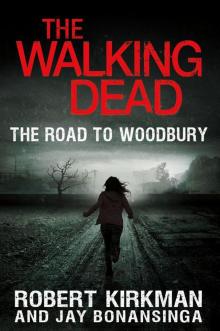 The Walking Dead: The Road to Woodbury
The Walking Dead: The Road to Woodbury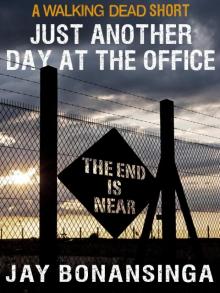 Just Another Day at the Office
Just Another Day at the Office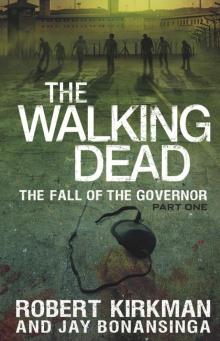 The Fall of the Governor: Part One
The Fall of the Governor: Part One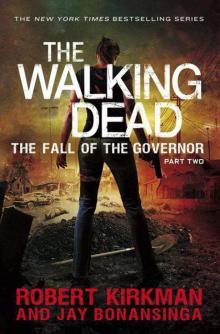 The Walking Dead: The Fall of the Governor: Part Two
The Walking Dead: The Fall of the Governor: Part Two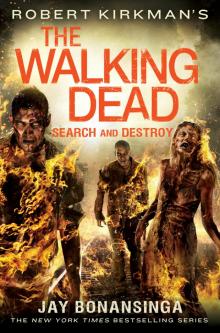 Search and Destroy
Search and Destroy Invasion
Invasion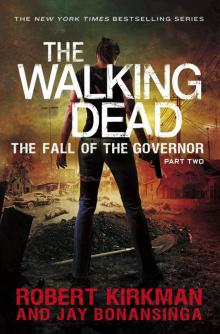 The Fall of the Governor: Part Two
The Fall of the Governor: Part Two The Walking Dead Collection
The Walking Dead Collection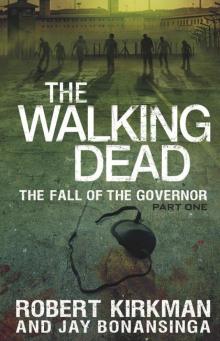 The Walking Dead
The Walking Dead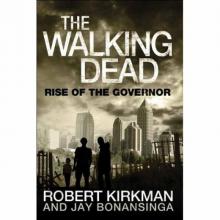 Descent
Descent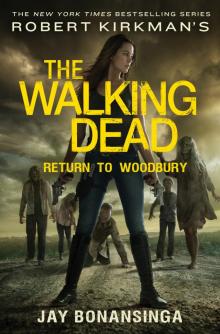 The Walking Dead: Return to Woodbury
The Walking Dead: Return to Woodbury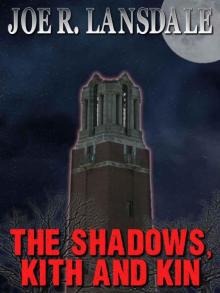 The Killer's Game
The Killer's Game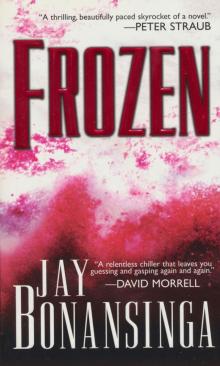 Frozen
Frozen Shattered
Shattered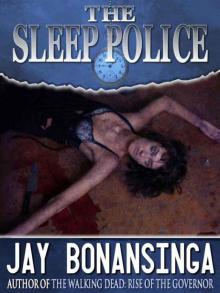 The Sleep Police
The Sleep Police Perfect Victim
Perfect Victim